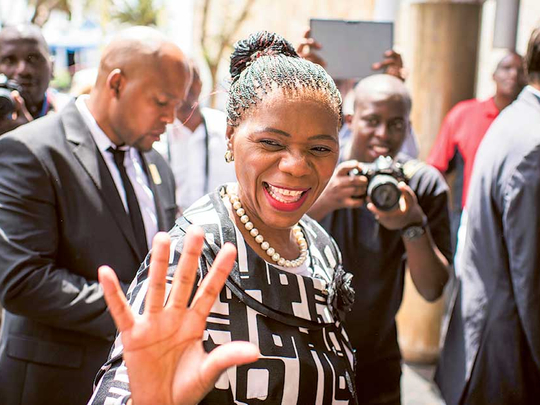
Johannesburg: As South Africa searches for a new state graft ombudsman, the eventual successor to Thuli Madonsela must balance rising public demands to intensify probes into corrupt officials and political pressure to tone down the office’s aggression.
Public Protector Madonsela, whose term ends in October, clashed with the government when she found President Jacob Zuma, 74, liable for repaying part of the state money spent upgrading his private home. Zuma and the African National Congress-controlled parliament largely ignored her recommendation until the Constitutional Court ordered the president to reimburse taxpayers.
“For whoever the replacement is, there’s going to be a great sense of expectation from the public,” said Lawson Naidoo, executive secretary of the Cape Town-based Council for the Advancement of the South African Constitution. “On the other hand, undoubtedly there’s going to be political pressure to narrow the scope and effectiveness of the work of the office.”
About 59 people have agreed to stand for the job, which has a salary package of 2.24 million rand (Dh557,459 or $154,000). They include Madonsela’s current deputy, Kevin Malunga, Pierre de Vos, a law professor at the University of Cape Town, and Kaajal Ramjathan-Keogh, a lawyer at the Southern African Litigation Centre, which filed the lawsuit seeking the arrest of Sudanese President Umar al-Bashir last year on war crimes charges.
Among those who’ve turned down the nomination to replace Madonsela are Thabo Mbeki, the former president who was ousted by his ANC colleagues in 2008, Gerrie Nel, the prosecutor in the Oscar Pistorius murder case, and former Finance Minister Nhlanhla Nene.
“I declined because I feel that at the moment the political climate is such that its very easy for the public protector to be tossed around by all the stakeholders and players,” Nomboniso Gasa, a political analyst, said by phone. The prevailing political environment has made public institutions “very unattractive.”
Jackson Mthembu, the ANC’s chief whip in parliament, called the public protector’s office crucial and said the process of replacing Madonsela is being done transparently and meticulously. The ANC hasn’t been involved in nominating candidates, he said by email.
Still, there’s a risk that the ANC will use its parliamentary majority to appoint someone who’s not as “determined and as unrelenting” as Madonsela, said Bonita Meyersfeld, a law professor who heads the University of the Witwatersrand’s Centre for Applied Legal Studies.
“She has been a real thorn in the side of this government as the public protector should be,” Meyersfeld said.
Madonsela, 53, was named one of Time magazine’s 100 most influential people in 2014. She capped her seven-year term in office by finding Zuma responsible for the repayment of part of the 215.9 million rand of taxpayers’ money spent on his private home in Nkandla, in the eastern KwaZulu-Natal province.
After initially refusing to make a repayment, Zuma backed down when the case went to the Constitutional Court, which ruled on March 31 that he “failed to uphold, defend and respect the constitution.” The Treasury last month said the president must pay about 7.81 million rand for non-security-related features, including a swimming pool and cattle enclosure.
One of the candidates, 44-year-old Narnia Bohler-Muller, who’s head of the Democracy, Governance and Service Delivery unit at the Pretoria-based Human Sciences Research Council, said reports of death threats aimed at Madonsela made her a “little scared.” Madonsela received a text message this year informing her that a gang boss had been paid to organise her assassination, the Sunday Times reported May 8.
The public protector’s office was set up under the constitution that came into force after the end of apartheid in 1994 to investigate alleged improper conduct in government.
It’s “extremely important in that in protects not only our democracy in general but the masses against possible abuse and maladministration by the executive and private sector players who act in an illegal manner,” said former ANC treasurer Mathews Phosa.
Madonsela’s successor will take over the investigation into allegations that Zuma has allowed a wealthy Indian family, whose members are his friends, to wield undue influence over state business. Deputy Finance Minister Mcebisi Jonas alleged that Gupta family members offered him the post of finance minister. The Guptas denied any wrongdoing, and Zuma has said only he has the power to appoint ministers.
“Any office is as good as the incumbent,” a former labour union leader, Zwelinzima Vavi, said by phone. “If the incumbent is weak, the office will be weak. We have had many public protectors since 1994, but many people can’t even remember the names of Madonsela’s predecessors. Thuli Madonsela will be remembered by generations to come.”












